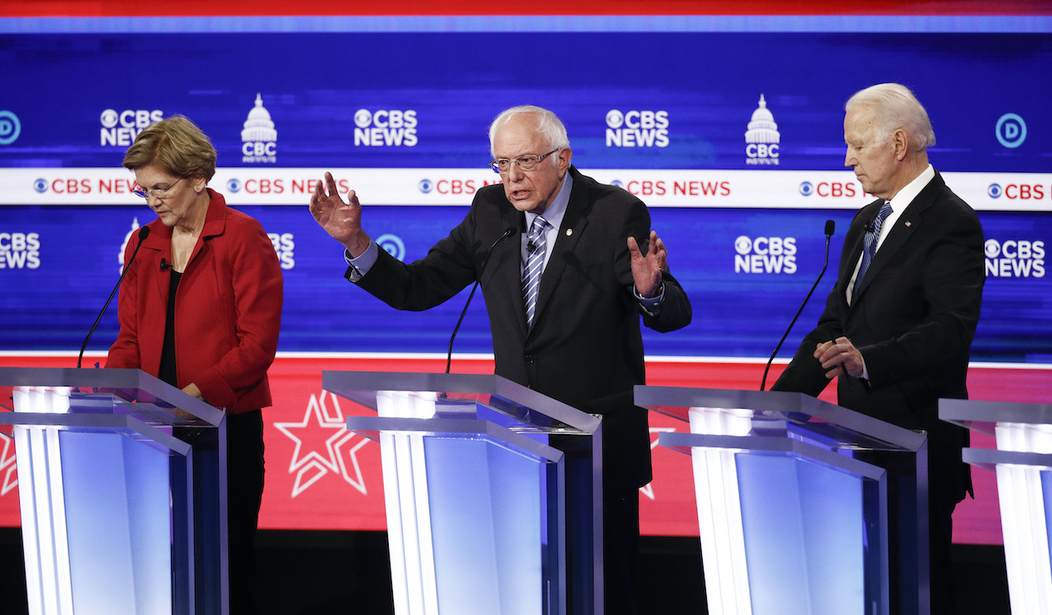With U.S. debt having soared to all-time highs and massive budget deficits as far as budgeters can see, the progressive refrain is the same: "ensure the wealthy pay their fair share." But a new tax wish list put out by 80 progressive groups shows that the math simply doesn't add up. Even in their wildest dreams of taxing the wealthy, they can't close the current budget deficit, much less pay for their new spending priorities like Medicare For All or the Green New Deal.
The progressive soak-the-rich fantasy includes a wealth tax, a higher corporate tax rate, a higher estate tax, a financial transactions tax, and more spending on tax enforcement, just to name some of the more notable proposals. Considering how progressives speak of Medicare for All as an easily achievable, common sense solution, one would imagine that this list would more than cover the $32 trillion price tag. In reality, it doesn’t even come close. All told, this wish-list would cumulatively raise “just” $7.78 trillion: that’s not even close to our projected budget deficit (over $12 trillion) and less than a quarter of the needed revenues for Medicare for All.
That alone should put to bed the myth that the progressive agenda can be funded by “eating the rich.” But what’s even worse is that the list includes overly optimistic assumptions and fails to take into account the economic impact of such massive tax increases, which means the realistic picture is even worse.
Take the proposed 2 percent wealth tax which the organizations claim could raise $3 trillion. Not only would such a tax disincentivize safe, low-yield investments, it would also be an administrative nightmare (one reason European countries have largely moved away from such taxes). Taxpayers and tax administrators would have to value many non-liquid assets like art or intellectual property on an annual basis — creating headaches and expensive legal disputes in the process. To think that such a tax would raise anywhere close to $3 trillion is a fantasy that ignores the difficulty inherent in such a levy.
Recommended
A similar overstatement comes in the form of the proposal to raise $700 billion on net by increasing tax enforcement spending by $80 billion. This estimate is based on a misleadingly-high estimate of how many dollars in taxes go uncollected, and is way out of step with other estimates. The Congressional Budget Office, the nonpartisan budget scorekeeper, estimates that increasing enforcement spending by $40 billion would raise just $63 billion on net, with returns diminishing with increasing enforcement spending.
It’s also absurd to suggest that substantial tax increases on the investors and job-creators that power the economy would come without consequences. Even the biggest believer in taxing the rich could not argue with a straight face that $7.78 trillion in taxes on the wealthy, investors, and corporations would come without consequences.
And while progressive tax proposals could not come within spitting distance of the price tag of Medicare for All, that’s hardly the only spending item they dream of. From government-provided childcare, paid family leave, infrastructure, student loan forgiveness, and the nebulous Green New Deal, there’s plenty more that progressives want to spend taxpayer dollars on. And if you can’t count on the rich to cover the bill for Medicare for All alone, you can imagine the middle class would be on the hook to pay for these spending items as well.
Progressives have for some time relied on the eye-watering amounts of taxpayer dollars the federal government handles to mislead taxpayers on what they’d be stuck paying for for far too long. Looking at their own math, unrealistically optimistic as it is, can be instructive to pierce through this smokescreen.
Andrew Wilford is a policy analyst with the National Taxpayers Union Foundation, a nonprofit dedicated to tax policy research and education at all levels of government.

























Join the conversation as a VIP Member